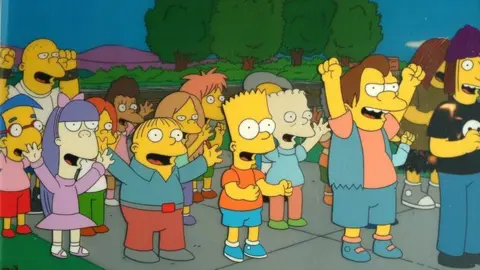Disney removes Simpsons 'forced labour' episode in Hong Kong
 Getty Images
Getty ImagesDisney has removed an episode of The Simpsons referring to Chinese labour camps from its streaming service in Hong Kong.
The absence of the One Angry Lisa episode in its latest season was flagged in media reports this week. It is unclear when it was removed.
Disney has declined to reply to the BBC's queries.
There have been rising concerns about censorship in Hong Kong after it passed several controversial laws.
The city had previously had access to more civil freedoms than the Chinese mainland, but Beijing has clamped down on these rights since major pro-democracy protests rocked the city in 2019.
In the episode, which first aired last October, the character Marge Simpson is shown images of the Great Wall of China during an exercise class.
During the class, her instructor comments: "Behold the wonders of China: Bitcoin mines, forced labour camps where children make smartphones."
The BBC has reported that hundreds of thousands of ethnic minority people in the western region of Xinjiang have been forced into manual labour.
The Chinese government denies this and says the factories are part of a voluntary "poverty alleviation" scheme.
The Simpsons has been shown on and off in mainland China since the early 2000s. Clips from the current season can be found on Chinese streaming sites, but not of that particular scene, according to a BBC check on Tuesday.
The removal of the latest Simpsons episode comes after Disney in 2021 also removed a show episode referring to the 1989 Tiananmen Square crackdown.
Censorship of Western TV is commonplace in mainland China, and critics say this pattern has been increasing in Hong Kong.
Hollywood studios have previously been accused of removing potentially objectionable content to Chinese censors in order to retain access to the large Chinese market.
In 2020, Hong Kong passed a wide-ranging national security law which criminalises acts of subversion, or undermining the power or authority of the central government.
Authorities say it is necessary to maintain order, but opponents say it has been used to silence critics and democracy activists. On Monday, the trial for Hong Kong's largest national security case began with 47 people accused of "subversion".
In 2021, the city's legislature passed a film censorship law aimed at content deemed to "endorse, support, glorify, encourage and incite activities that might endanger national security".
Officials said at the time that the law did not apply to streaming services.

